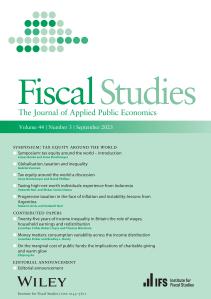Candidates to replace Theresa May as Prime Minister have wasted no time in making rather specific and expensive pledges on tax and spending – while being rather less specific about their overall plans for the public finances.
Boris Johnson's proposal to borrow more in order raise the National Insurance Contributions (NICs) upper earnings limit and Income Tax higher rate threshold from £50,000 to £80,000 has garnered more attention than most - perhaps because he is seen as the front runner.
But it’s also garnered attention because of how they might affect Scotland. There have been claims that the fact that NICs aren’t devolved but Income Tax is mean that Mr Johnson’s plans imply Scots would end up paying for a tax cut for higher earners in the rest of the UK.
This observation argues that this is not the case. That’s because Scotland’s fiscal framework means the reduction in tax bills and revenues in the rest of the UK translates into higher block grant funding for the Scottish Government. This would allow for higher spending on public services north of the border. Or for the Scottish government to cut its own taxes – perhaps matching Mr Johnson’s proposed cut to income tax for high earners.
A tax grab on Scotland?
In the first instance, the increase in the NICs upper earnings limit would mean that people throughout the UK that earn more than £50,000 would have to pay higher NICs. This tax rise would apply in Scotland as in the rest of the UK because NICs aren't devolved. Those earning between £50,000 and £80,000 would pay an extra 10p in every £1 they earn in NICs, meaning an extra bill of up to £3,000 a year more for those earning £80,000 or more.
On the other hand, while those with incomes above £80,000 in England, Wales and Northern Ireland would see an income tax cut of £6,000 a year, the income tax cut wouldn’t automatically apply to the majority of taxpayers in Scotland. That’s because income tax (except that charged on savings and dividends income) is devolved: it’s up to Scottish Ministers what income tax bands and rates apply in Scotland.
So with Scots paying up to £3,000 a year in extra NICs but not seeing the fall in Income Tax enjoyed by high earners in the rest of the UK, doesn't that mean Scots would effectively be subsidising a tax cut for high earners south of the border?
Despite what some have claimed, the answer is "No".
Now, for the science bit
That's because when the income tax cut takes effect in the rest of the UK, the income tax revenues raised in the rest of the UK will fall. And Scotland's fiscal framework - the set of rules saying how tax and spending decisions taken in Westminster and Edinburgh interact - means that this fall translates into higher block grant funding for the Scottish Government.
Why? Because the framework says that if income tax revenues fall in the rest of the UK, we should assume they have fallen in Scotland too - and Scotland should get extra block grant to make up for these falls. (Technically, the ‘block grant adjustment’ made to Scotland’s block grant funding when income tax was devolved is indexed to the growth in income tax revenues per person in the rest of the UK. This is so the Scottish Government gains when its revenues grow faster than those in the rest of the UK and loses when they grow more slowly. This is intended to provide appropriate incentives for revenue growth, and to ensure both governments bear the cost or reap the rewards from their tax policies. We have previously written extensively about this system).
The upshot
This means the Scottish Government actually gets a budget boost because of the income tax cut in the rest of the UK. It is, initially, getting the same revenues from its own income tax, and more in block grant funding.
It could choose to spend that money on devolved services - schools, hospitals, and the like. Scots would in effect be paying for just under half of this (through their higher NICs), with the remainder being paid for by higher borrowing by the UK government.
Or it could use the money to cut taxes. It could use it to cut income tax for high earners as in the rest of the UK. Indeed, there might be pressure for it to do so, to avoid high earners moving south or setting up incorporated businesses so that they can be paid in dividends to take advantage of the lower tax rates offered by Westminster. Or the Scottish Government could also do something else - cut income tax for low earners, or cut business rates, for example.
But either way, Scots wouldn't be subsidising a tax cut in the rest of the UK. Claims that they would be are wrong and either based on a misunderstanding or a misrepresentation of how Scotland's Fiscal Framework actually works.
Instead, Scots would either enjoy higher spending on public services. Or could see equivalent-sized tax cuts themselves. Or some combination of the two.
Now this isn't a free lunch. These goodies would be paid for by the same UK government borrowing that Mr Johnson has suggested he would use to fund the income tax cut he proposes for the rest of the UK. But the question of whether we should borrow more is one that affects the whole of the UK – not something unfairly impacting Scotland per se.
Fiscal hawks and fiscal frameworks
The story above changes somewhat if rather than being funded by borrowing, Mr Johnson’s tax cut for high earners was funded by lower spending.
In that case, lower spending on public services in England would feed through the Barnett Formula into the Scottish block grant. This ‘Barnett consequential’ from lower spending in England would offset part of the increase in the block grant due to the assumption of lower income tax revenues made by the Fiscal Framework.
If the Scottish Government wanted to match Mr Johnson’s income tax cut (or make an equivalent sized tax cut for low earners or businesses), it would then have to accept a smaller budget for public services. But so would residents of England, Wales and Northern Ireland.
If it wanted to maintain its spending on public services, it would still have enough money to cut income tax so that the average amount of NICs and income tax paid by high earners in Scotland didn’t increase (though the Scottish Government’s previous tax policy decisions mean it would still be higher than in the rest of the UK).
But it couldn’t exactly offset the increase in NICs bills for every higher earner though. This is because the tax base for income tax and NICs differs. Pensioners would benefit from an income tax cut but don’t pay NICs, for instance. So they’d end up seeing their overall income tax and NICs bill go down. On the other hand, working age people would see their overall income tax and NICs bill go up a bit under such a scenario.
So while Scots still wouldn’t be paying for a tax cut for England, the fact that NICs are not devolved means that the Scottish Government would lack the power to ‘undo’ Mr Johnson’s tax plans. Full or partial devolution of NICs would be needed to allow this – and the complex interactions between NICs and income tax mean that if further devolution was seen as desirable, NICs would be a sensible candidate. Whether substantial further devolution of taxes is desirable though is a broader question – not least because it could reopen questions about how to address Scotland’s large implicit budget deficit.
Final thoughts
But back to where we started: while the immediate effect of Mr Johnson’s plans would be to increase the NICs bills of high earners in Scotland, they wouldn’t represent an unfair grab of Scottish money.
Claims to the contrary seem to result from confusion about how Scotland’s fiscal framework operates. There is therefore a broader lesson to be learnt: a better understanding of that Fiscal Framework by all engaged in fiscal policy debates is vital, if voters north and south of the border are to make sense of the actual consequences of policy proposals. Otherwise misunderstandings or misrepresentations mean that rather than improve the financial accountability of the Scottish Government, tax devolution may end up muddying the waters even further. Unfair points will be scored, bucks will be passed, credits unduly claimed and voters more confused than ever before. That'd be an outcome that should please no-one.









